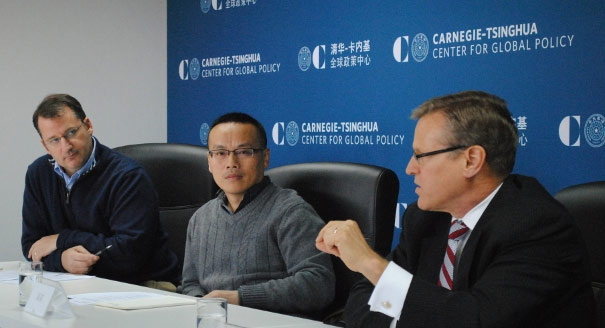Registration
You will receive an email confirming your registration.
During the first meeting between U.S. President Barack Obama and Chinese President Xi Jinping at the Sunnylands Estate, Xi proposed the concept of a “new type of great-power relations” as a framework for the bilateral relationship. Since then, numerous questions still remain as to how this concept will play out.
Carnegie-Tsinghua’s Chen Qi hosted a panel featuring Patrick Cronin and Ely Ratner of the Asia-Pacific security program at the Center for a New American Security, and Chinese scholars to discuss China’s changing foreign policy and a possible new direction for U.S.-China relations.
Evidence of Transformation
Recent developments in Chinese foreign policy mark a transformation in Chinese diplomacy with clear implications for the U.S.-Chinese relationship.
- Enhanced Regional Cooperation: Carnegie-Tsinghua’s Zhao Kejin explained that China has focused on developing more positive relations with its neighbors. Zhou Fangyin, a scholar at the Chinese Academy of Social Sciences, added that China believes that improving its relations with its neighbors, including U.S. allies, will help China to take initiative and improve its status.
- Deviations from Non-Interference Policy: Carnegie-Tsinghua’s Paul Haenle pointed out that China met with both the Qaddafi regime and members of the opposition during the Libyan civil war, demonstrating a break from China’s traditional policy of non-interference in other nations’ internal affairs. China’s increasing global interests may raise its stakes in stabilizing regions such as the Middle East.
- Increased Assertiveness: Zhao noted that China is more confident and willing to take a hard stance against the United States on issues such as the Diaoyu/Senkaku Islands dispute. Carnegie-Tsinghua’s Zhang Chuanjie agreed that policies have recently changed, but cautioned that this newfound assertiveness results not from a fundamental shift in China’s foreign policy but rather from increased capability.
Primary Challenges
Despite willingness in both the United States and China to explore the concept of a “new type of great-power relations”, there are still many challenges to creating a more constructive and mutually beneficial bilateral relationship.
- Public Opinion: Haenle noted the contrast between the relatively mild reaction of the Chinese government to the U.S. pivot to Asia and the outrage found on Chinese social media. Similarly, he emphasized the U.S. public’s reluctance for the United States to cooperate more with China. Much of the U.S. public sees China in a negative light for economic reasons, and both countries must focus on public diplomacy in order to create support for increased bilateral cooperation.
- Existing Disputes: Ratner emphasized that if China did not change its position towards regional U.S. allies such as Japan and the Philippines, there would not be a new type of great-power relations. Chen reiterated that a rising China will not comply with a shift in U.S.-China relations if the United States does not control what China perceives as aggressive behavior from Japan. Avoiding a direct military confrontation between China and Japan remains the biggest challenge in the U.S.-China bilateral relationship.
- Possibility of Nuclear Escalation: Zachary Hosford, a fellow at the Center for a New American Security, added that the nuclear aspect of the U.S.-China relationship has often been overlooked. While existing concerns focus on trade and the possibility of a conventional military confrontation, the United States cannot discount the possibility that China may opt to modernize its nuclear arsenal and increase its nuclear capability.
Future of the New Type of Great-Power Relations
Despite ongoing challenges, there are still many possible areas of cooperation for China and the United States. Panelists agreed that both countries must focus first on cooperation before attempting to immediately resolve long-standing disputes.
- New Direction of Chinese Soft Power: Zhang asserted that China’s soft power has so far been ineffective in improving its international image. He recommended that China steer away from using government-initiated projects to increase soft power and instead focus on allowing a more liberalized society, citing South Korean soft power as an example of this model’s success.
- Revoking the Non-Interference Principle: Cronin pointed out that China’s economic development means that it now has a stake not only in international security but also the domestic stability of other countries. He explained that, as the world’s largest importer of Middle Eastern oil, China is now dependent on regional stability in the Middle East to grow the Chinese economy, and may have to deviate from its non-interference principle in order to protect its overseas interests.
- Focus on Global Issues: Carnegie-Tsinghua’s Tang Xiaoyang stated that China and the United States complement each other in the development of Africa. Haenle agreed and reiterated that the two nations must focus less on solving core bilateral disputes and instead allocate more resources towards collaboration in areas such as climate change and environmental protection in order to shift the direction of the U.S.-China relationship.
Discussants included Zhao Kejin, Zhang Chuanjie, Zhou Fangyin, Tang Xiaoyang, Zachary M. Hosford
